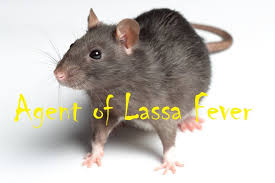Photo credit: buzznigeria.com
Thank God Ebola is gone. But sadly, it’s ‘Mr.
Lassa’ in town now. While Nigerians are not yet really serious with this killer
disease, the death toll is rising. It is important to be aware of what we’re
dealing with and fight it individually in our own little way. Here are a few things to know about Lassa fever:
· Lassa fever is a rodent-borne infection caused by the Lassa
virus.
· It is named after a town in Borno State, Nigeria.
· It is one of the viral hemorrhagic fevers prevalent in the West
Africa region. Common in Nigeria, Sierra Leone, Guinea, it occurs between
November and April when bush burning is practised widely.
· Humans get infected when our food or cooking utensils are
contaminated by the urine or faeces of infected rats.
· Humans infect other humans through direct contact with infected
body fluids: urine, blood, sputum.
·
Be
aware that signs and symptoms of the fever generally appear 1-3 weeks after
contact with the virus.
·
Research is under way to
develop a vaccine for the illness.
PREVENTIVE MEASURES
- Bushes and clutters around the house must be cleared to make the surrounding unattractive to rats.
- Food, cooking utensils and drinking water must be kept in rat proof containers.
- Avoiding human to human transmission through direct contact with body fluids.
- Close contact of individuals with any illness involving fever that does not respond to treatment for malaria should be avoided.
- Always make use of hand sanitizers.
- Health workers must wear gloves, protective gowns and masks while caring for individuals suspected of Lassa fever.
- Specific team of health workers must be identified to care for suspected patients, who must be nursed in isolation.
SIGNS AND SYMPTOMS
- Fever.
- Pain behind the chest wall.
- Sore throat.
- Diarrhea.
- Pink eye (conjunctivitis).
- Back pain.
- Swelling of the face.
- Protein in the urine.
- Mucosal bleeding (nose, mouth, lungs, and digestive
tract).
- Cough.
- Stomach pain.
- Vomiting.
- Hearing loss.
- Tremors.
- Encephalitis (infection/inflammation of the brain).
TREATMENT
- All persons suspected of Lassa fever infection should be admitted to isolation facilities and their body fluids and excreta properly disposed of.
- Know that the treatment for the fever consists of an antiviral drug, Ribavirin.
- Those with the fever should also receive care consisting of maintaining appropriate fluid and electrolyte balance, oxygenation and blood pressure, and treatment of other infections that can occur.


No comments:
Post a Comment